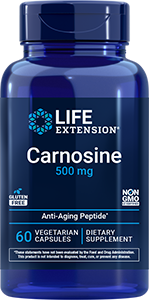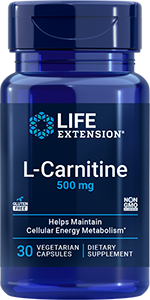
L-Carnosine vs. L-Carnitine: Which Is Best for You?
Published: June 2024
We all want to live strong and healthy lives. But unfortunately, as we age, it's common to notice unwelcome changes in our bodies, whether they be changes to your skeletal muscles or how you manage your weight.
Along with dietary changes and exercise, nutrients in the amino acid family like carnosine and carnitine can help, with each offering a number of benefits for supporting muscle function and overall well-being. But, while these two compounds might sound similar in name, they couldn't be more different when it comes to the ways in which they support your health.
That said, whether you're a gym enthusiast aiming to build more muscle or someone simply looking to age more gracefully, carnosine and carnitine could be the game changers you're looking for.
Let's break these two compounds down, explore their similarities and differences and help you discover how to utilize them effectively for your needs.
What's the difference between carnosine and carnitine?
As with homonyms like the dreaded "two, to, and too," people sometimes have trouble keeping carnosine and carnitine straight because they sound so alike. But the truth is, while both are essentially related to amino acids, carnosine and carnitine otherwise have very little else in common.
What are the benefits of carnitine?
L-carnitine is found in dietary sources (especially animal sources) and can also be synthesized in the liver, kidneys, and brain from the amino acids lysine and methionine. And it comes with a wealth of benefits:
Cellular energy
—Remember the term "mighty mitochondria" from seventh-grade biology class? The mitochondria are the basic structures responsible for creating the energy your body needs to function and can be helped along in this process by carnitine. For its part, carnitine plays a critical role in transporting fatty acids to cellular mitochondria, where they're oxidized to create cellular energy. This makes carnitine essential for anything requiring energy, whether that be doing chores throughout the day or trying to hit a new personal best in the gym.Exercise performance
—Speaking of personal bests, research suggests that carnitine supplementation may improve acute exercise performance by boosting maximum oxygen consumption. This translates to the ability to generate more physical power, protect against occasional discomfort and soreness and even decrease exercise recovery time.Healthy glucose metabolism
—Besides its advantages to your energy and gym goals, carnitine can also help support healthy blood glucose metabolism and metabolic efficiency—both of which are useful for supporting healthy weight loss, nutrition and overall health.
What are the benefits of carnosine?
Carnosine is a dipeptide composed of beta-alanine and L-histidine, and the effects of carnosine are primarily helpful for exercise, muscle development and to act as a buffer against glycation (i.e., how sugars can impact your body). We'll cover each of these in more detail below.
Lean muscle mass
—First, let's talk about how carnosine helps with exercise. Because our muscles naturally contain high levels of L-carnosine, it's not terribly surprising that carnosine supplementation can help support lean muscle mass and enhance your performance in workouts. And research backs this up, with one study even finding that 500 mg of carnosine once per day helped enhance exercise performance. That said, carnosine levels decline with age, which means it's important to monitor your levels over time and supplement as needed.Heart health
—We've covered what this nutrient can do for muscles quite a bit, but we've been referring to skeletal muscles. But did you know that the heart is a muscle as well? As it turns out, carnosine is also a secret weapon for your heart. A recent study showed that carnosine supplementation can actually promote already-healthy triglyceride levels and support a healthy heart.Cellular protection
—When you think about antioxidants, carnosine may not be the first supplement to come to mind. However, this compound is known for being an almost perfect antioxidant, due to its ability to combat oxidative stress in the body. Histidine, a key component of L-carnosine, plays an important role here because it acts as a shield against advanced glycation end (AGE) products, which can negatively impact our cells over time. A study found that one of the effects of carnosine was a drop in serum pentosidine, a marker for AGEs.
Explore Our Best Active Lifestyle & Fitness Supplements
Should you take carnosine or carnitine?
We've talked a lot about the powerful effects of both carnosine and carnitine on the health of the heart and muscles, the protective roles each plays, and the various ways in which each can help support cellular and metabolic health.
So here comes the million-dollar question: which one should you take? The short answer: it depends on your goals. If you're focused on boosting gym performance, carnitine might be your best bet. However, if you're concerned about age-related muscle decline, want to inhibit AGE formation or want overall protection against oxidative stress, carnosine could be more suitable.
If you're focused on all the above, go ahead and take them both!
Which forms of carnosine and carnitine are best to take?
Both carnosine and carnitine are available in various forms. (For the purpose of our comparison, it's important to note that we've been discussing the "L" varieties—L-carnosine and L-carnitine—and the benefits we're describing here come from taking those specific forms.) When deciding between powders, capsules, liquids and other forms, consider your lifestyle and what will be easiest for you to add to your routine, but also be picky about the supplement itself: choose a brand that bases its dosage upon clinical studies and uses quality ingredients.
Outside of supplementing, you can also get these amino acids in your diet. For example, both carnosine and carnitine can be found in many meat products, including beef, poultry, and pork.
Carnitine vs. carnosine: Which will you choose?
When comparing carnitine and carnosine, it's clear these two supplements offer a number of benefits.
To recap, carnitine can boost energy production and workout performance, and can help with fat metabolism and heart health, making it helpful if you're a fitness enthusiast. Meanwhile, carnosine's antioxidant properties and ability to inhibit AGE formation and support muscle health make it useful for individuals looking to maintain their muscle function as they age.
If you're trying to decide which supplements might be right for your health and nutrition needs, a quiz might help. As always, be sure to chat with your healthcare provider to see if these supplements are a good fit for you.
About the Author: Trent Fowler has been covering health and wellness for more than a decade. A technical writer and content specialist, he is also the co-host of the Futurati Podcast and writes about fintech, AI, and other emerging technologies.
References
- Costell M, et al. "Age-dependent decrease of carnitine content in muscle of mice and humans." National Library of Medicine. June 1989. https://pubmed.ncbi.nlm.nih.gov/2742580/
- Fathizadeh H, et al. "The effects of L-carnitine supplementation on glycemic control: a systematic review and meta-analysis of randomized controlled trials." National Library of Medicine. 2019. https://www.ncbi.nlm.nih.gov/pmc/articles/PMC6785772/
- Fielding R, et al. "L-Carnitine Supplementation in Recovery after Exercise." National Library of Medicine. 2018. https://www.ncbi.nlm.nih.gov/pmc/articles/PMC5872767/
- Houjeghani S, et al. "l-Carnosine supplementation attenuated fasting glucose, triglycerides, advanced glycation end products, and tumor necrosis factor-α levels in patients with type 2 diabetes: a double-blind placebo-controlled randomized clinical trial." National Library of Medicine. 2018. https://pubmed.ncbi.nlm.nih.gov/29420997/
- Lombardi C, et al. "Effects of oral administration of orodispersible levo-carnosine on quality of life and exercise performance in patients with chronic heart failure." National Library of Medicine. 2015. https://pubmed.ncbi.nlm.nih.gov/25287762/
- Prokopieva VD, et al. "Use of Carnosine for Oxidative Stress Reduction in Different Pathologies." National Library of Medicine. 2016. https://www.ncbi.nlm.nih.gov/pmc/articles/PMC4745351/
- Sureshkumar K, et al. "Effect of L-Carnosine in Patients with Age-Related Diseases: A Systematic Review and Meta-Analysis." National Library of Medicine. 2023. https://pubmed.ncbi.nlm.nih.gov/36722274/
- Xu Y, et al. "L-carnitine treatment of insulin resistance: A systematic review and meta-analysis." National Library of Medicine. 2017. https://pubmed.ncbi.nlm.nih.gov/28791854/
- "L-Carnitine." Data on file.
Always be in the know!
Access the latest deals, wellness news, expert health tips & more!









